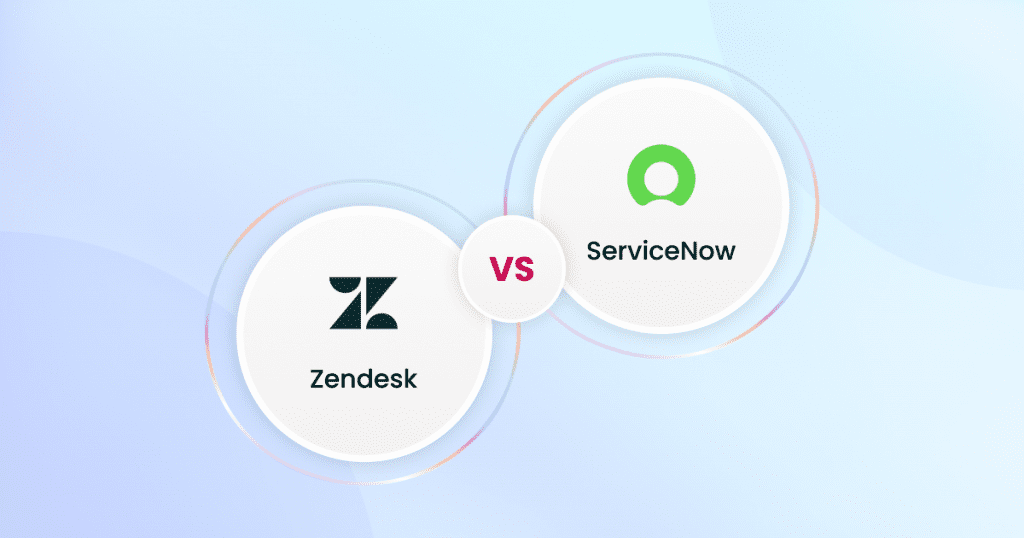Quality customer service is important for today’s companies, which is why they use live agents and AI-powered tools in buying and supporting processes.
These include the use of website chat software for making real-time shopping recommendations, the provision of services that allow customers to access various asset management tools as well as other financial services through IVR call menus, and live video product tutorials geared towards enticing consumers and teaching them new ways of using.
These strategies may be helpful, but they address a few stages in the customer’s journey, not the whole one. The Zendesk and ServiceNow solutions for CX encompass customer services but are not confined to them.
Zendesk and ServiceNow both provide strong customer experience solutions: Zendesk for Service and ServiceNow CSM.
This article aims to provide a comparative study on various aspects of Zendesk vs ServiceNow. These include their products/ key features, pricing models, strengths and weaknesses, etc).

Key Takeaway :
Zendesk and ServiceNow are two popular service management platforms that have similarities such as integrations with other platforms, customization options, ticket and asset management functionalities, cloud-based solutions, and designed for IT service management. However, they also have differences in terms of user interface, pricing, ITSM solutions, and customization and automation. Whether Zendesk is better than ServiceNow depends on the specific needs and scale of the company, with Zendesk being a good choice for small/medium businesses and ServiceNow being suitable for extensive companies. Zendesk is generally cheaper than ServiceNow, but the decision should be based on the organization’s requirements, financial constraints, and required capabilities. Zendesk can integrate with ServiceNow through third-party tools like Zapier and Workato. Whether ServiceNow can replace Zendesk depends on the wider service management requirements and the magnitude of possible adaptation and expansion.
ServiceNow compared to Zendesk: Overview
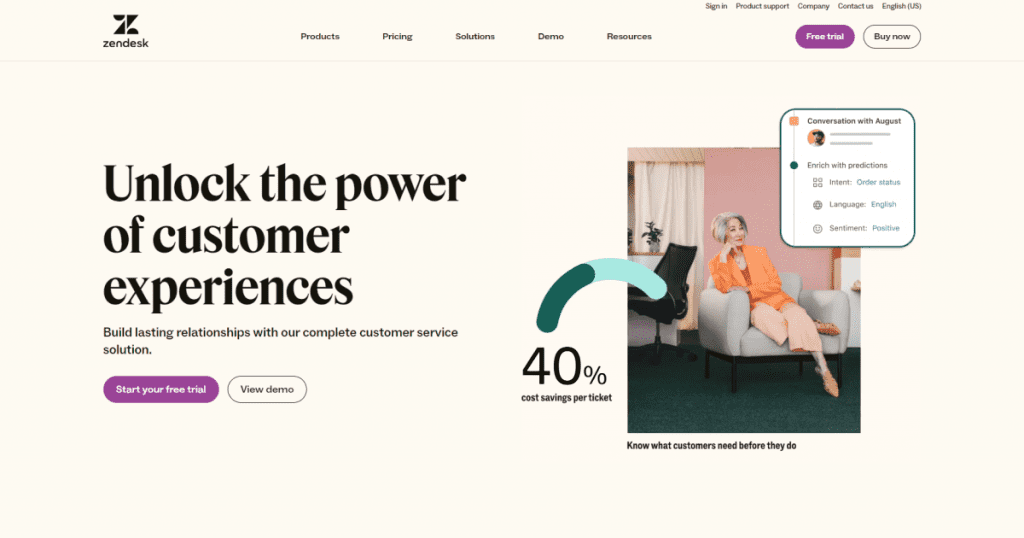
In terms of customer support and service management, there is a strong comparison between Zendesk and ServiceNow in their suitability for different organizations.
ServiceNow is a strong, all-encompassing service management system tailored for larger enterprises and organizations that have intricate support processes. It incorporates ITSM, CSM, and FSM, among other comprehensive functions. ServiceNow does well regarding flexibility in payment structure, scalability, and integration abilities.
Zendesk is simple and cost-effective but cannot scale nor the depth of management required to be able to align customer service with a broader support system. So, It will depend on the size, complexity of your organization, and the specific customer support you require.
You can check a few decent Zendesk competitors here.
ServiceNow
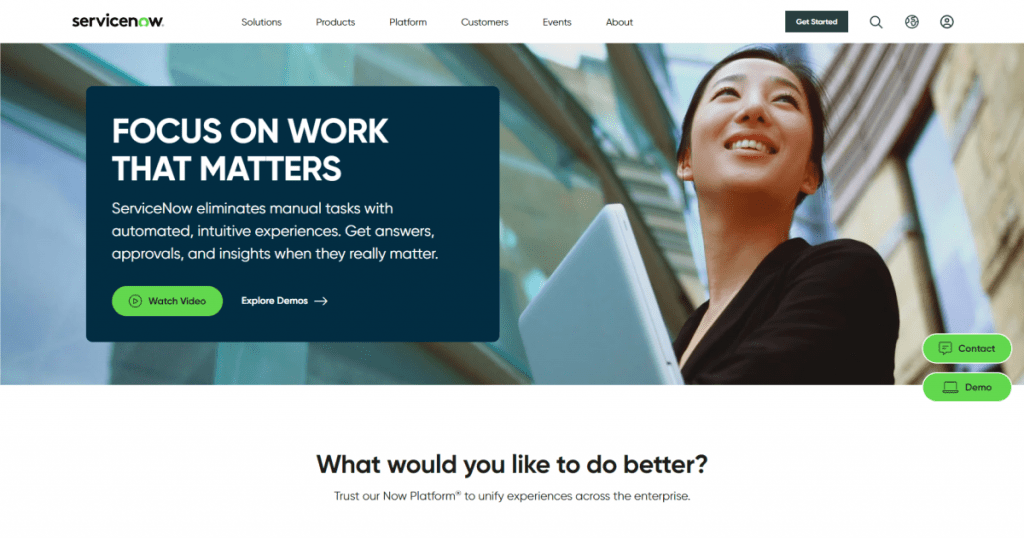
The renowned ITSM provider, ServiceNow, takes their expertise a step further by incorporating a system that encompasses customer service as well. Famous for its top business proficiency functions, ServiceNow consists of one universal platform with the ability to handle IT services and customer support.
Incident and problem management is strong enough for complex business structures. Automating customer service is only one piece in ServiceNow’s broad portfolio of services that can benefit an organization.
It could be quite a learning curve, but its scalability, combined with ITSM integration, makes ServiceNow a strategic choice for enterprises looking for all-encompassing service management solutions in the marketplace.
Desku as an Alternative
✅ Powerful self-service capabilities
In the knowledge era, information equates to power, and Desku’s self-service abilities shine brightly among such powerful lights. However, it’s providing more than answers, and it’s giving users independence in seeking solutions. Desk’s self-service is not just a function but rather a promise to put the control back to the fingers. Desku offers more than just user support, from a strong knowledge base to intuitive self-help options so that the users feel that they are getting help.
✅ Robust Ticketing and Incident Management
The ticker itself is the heart of customer support. A symphony of efficiency is what Desku’s ticketing and incident management system does, not keeping the pulse. Desku involves itself in every stage and step of an incident, including ticket creation, prioritization, and resolution.
However, it has gone beyond issue management; it’s now a choreography of help, such that every step has harmonized well towards a prompt settlement of customer problems as well as agents.
✅ Extensive reporting and analytics
To this end, Desku’s reporting and analytics facilities are dashboards that are into other people’s souls. It is much more than a numbers game and involves identifying trends, predicting obstacles, and making sound decisions for the growth of your business. Desku’s report is more than a means; rather, it is a strategic partner providing evidence for every decision taken not based on instinct but on facts.
✅ Customization and flexibility
As a rule, for customer support solutions, there is no such thing as a “standard.” In this case, Desku pushes personalization to higher levels. However, it is more of a playground. Descu helps you craft ticketing workflow and change the interface into the picture of your support system as its canvas.
It is not simply a function. It is a flexible approach tailored for every specific shape of business so that Desku is not simply an alternative but an individualized, adaptable solution that grows with you.
✅ Outstanding user experience
Keep in mind user experience is not only about aesthetics but also about creating a home. Desku understands this profoundly. Desku does not need navigating; rather, it’s made so that anyone will intuitively enjoy traversing its interface.
All interactions involved in ticket creation and issue resolution are integral parts that make up a superior customer experience. Software is not enough! Desku is a user-centred system where people feel like they are being listened to, understood, and helped. You can check Desku Plans starting at just $29/month.
Similarities Between Zendesk vs ServiceNow
Though Zendesk and ServiceNow are different in most aspects, there exist a number of common points between them. Here are some of the main similarities between the two platforms:
- Integrations with other platforms: It is because Zendesk and ServiceNow easily link platforms and services that a business can collect all relevant information, and this way, work will be simplified for them.
- Customization options: The platforms provide features that enable businesses to design workflows, dashboards, and reports according to their individual requirements.
- Ticket and asset management: The two platforms also have ticket management and asset management functionalities that can be used by a business firm for managing its problems and assets, respectively.
- Cloud-based solutions: The two are cloud-based. Hence, one can access them through any location that has a connecting network. This facilitates teamwork for the remote teams.
- Designed for IT service management: Zendesk and ServiceNow are two popular systems meant to aid with IT service management where tasks such as issue tracking and incident management, among others, can be done.
- Customer satisfaction: Zendesk and ServiceNow emphasize customer satisfaction by providing systems that allow tracking of consumer actions, soliciting feedback, and monitoring performance metrics. Competitors like Intercom and HubSpot prove to be equally excellent in this department.
- Mobile apps: Mobile apps are also available for both of these platforms, thus affording one to interact with important features and information at one’s own convenience.
Zendesk pros and cons
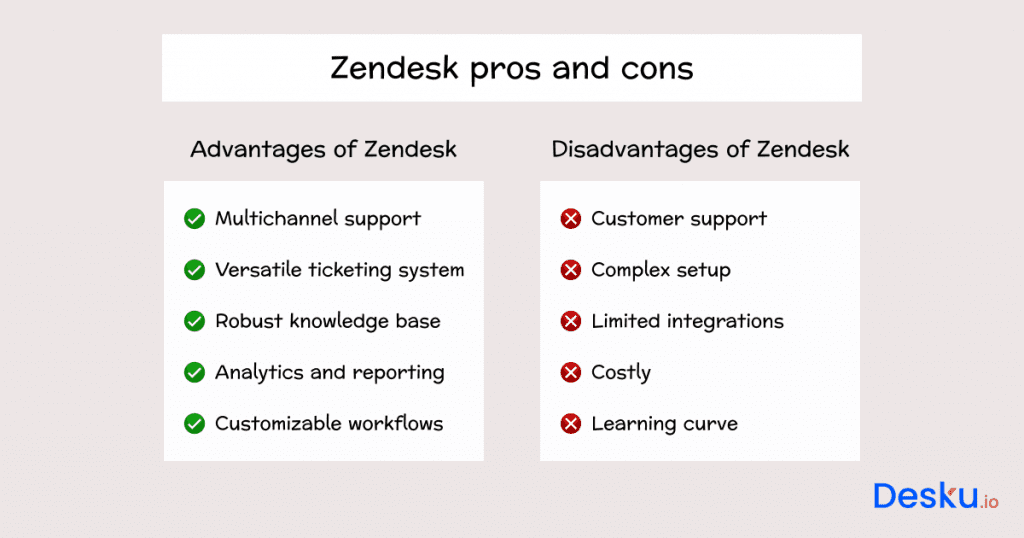
Zendesk advantages
- Comprehensive app store: It has more than 1200 third-party programs and connections. The resource could be crucial to any organization seeking to enhance its ITSM.
- Zendesk Explore: Comprehensive reporting and analytics for insightful decision-making and thorough tracking of performance.
- Multi-channel Support: The tool is great in multi-channel ticket management by linking with social networks, chats, and even emails. By adopting such an integration, agents are able to utilize one common workspace for effective service delivery.
- Enough features: Zendesk introduces many useful features, such as multi-channel messaging, a flow builder for workflow management, and advanced knowledge management tools. The Admin Center simplifies configuration tasks and makes the platform less complex.
- Unparalleled usability: This is a standout with regards to the user interface that allows companies to personalize the system towards particular needs and demands of the business.
Zendesk disadvantages
- Software integration and compatibility issues: It effortlessly integrates with other third-party apps and the in-house CRM solution for Zendesk Sell. Nevertheless, better versions of those services are accessed by most users on higher-tier plans.
- Pricing concerns by the size of business: Small to medium-sized businesses will certainly find this price structure problematic. The initial price is $49 per agent per month. Then, only the highest-level plans provide access to the enterprise-level feature(s).
- Limited Dashboard Customisation: At the basic plans, full customization of dashboards is only accessible at the higher tier level. The limitation could limit making analytics views in accordance with specific requirements.
- Reporting and analytics limitations: Although the Explorer tool comes with a variety of reporting features, only a few customization options are available for enterprise plan users. Particularly the pricing structure; users can see how Zendesk can improve this point, among many others.
If these negatives bother you, try out these interesting competitors of Zendesk.
ServiceNow pros and cons
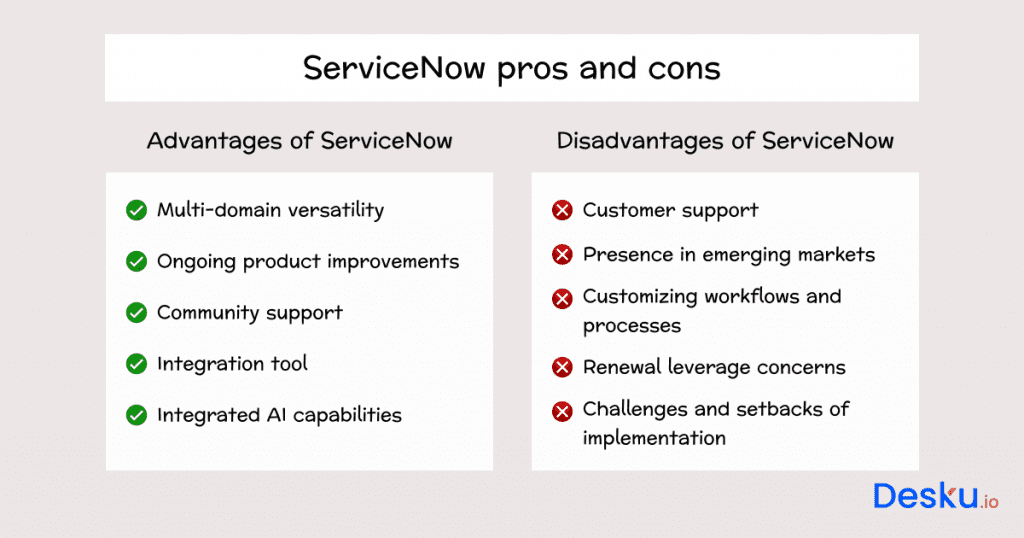
ServiceNow advantages
- Multi-domain versatility: Service-Now takes its value well beyond IT Service Management. The platform is also used by customers with different purposes, including HR, CEC, GRC, or ITOM.
- Ongoing product improvements: ServiceNow constantly improves its products through the acquisition of new technology and the development of new features. Customers are happy because the product is open about its future features on an updated roadmap.
- Community support: The company boasts of a fast-growing user community known as a thriving user community for ServiceNow. Their peers act as a recommendation channel for many clients, who then get the knowledge of how the platform works.
- Integration tool: ServiceNow has integration capabilities and tools that enable integration with other applications/systems smoothly. The ability allows for data sharing efficiency and workflow automation that, in turn, leads towards enhancing overall customer operational efficiency.
- Integrated AI capabilities: ServiceNow leverages AI and ML to deliver built-in AI capabilities. Virtual Agents of chatbots and predictive intelligence are among such features that improve the usefulness and operability of the platform.
- Flexibility: ServiceNow’s cloud-based infrastructure provides flexibility in scaling operations up, adapting to different needs, and offering remote working opportunities.
ServiceNow disadvantages
- Customer support: There are mixed views regarding customer support at ServiceNow as some users have pointed out time lags that often arise in seeking support, while some users find it hard to access ServiceNow’s customer care services.
- Presence in emerging markets: ServiceNow only has a few local offices in some emerging markets, such as the Middle East, and hosting options are also not widely available. This makes it challenging for organizations conducting business there to access or obtain necessary backup.
- Customizing workflows and processes: The platform might have limited flexibility of customization, so organizations are not able to adjust it according to their individual needs as well as special business procedures.
- Renewal leverage concerns: Due to their dominance, service customers may not be able to renegotiate contracts and renewals without sacrificing any current discounts or benefits.
- Challenges and setbacks of implementation: During implementation phases like that of configuration, data migration, and integration, organizations could experience implementation difficulties and delays. This could result in protracted implementation schedules as well as possible irritation.
- High cost: The high license costs and possible additional expenses associated with using the multifaceted application of service now, whose features and functionality are very vast. Such extra costs on customizations or specialized modules will make the total ownership costs very high.
- Challenges of new users: Some users have experienced a steep learning curve of ServiceNow’s platform as it is complicated. However, the system’s complexity can only be fully utilized through additional training and resources.
Differences Between Zendesk vs ServiceNow
We have now looked at the similarities between Zendesk and ServiceNow; let’s measure up the differences.
📌 User Interface
The interface of Zendesk is simple and easy to use by beginners (but not as easy as Gorgias or Desku). On the other hand, service now has a complicated system for use and may, at times, require some orientation time to be understandable.
📌 Pricing
Different businesses have different needs and, hence, different budgets. With Zendesk, there are free, professional, enterprise, and elite pricing plans that provide different extra features, such as advanced analytics, unlike ServiceNow, which is an open book type where companies send quotation requests tailored to their special requirements and needs.
📌 ITSM Solutions
Both platforms are ITSM solution-oriented. However, ServiceNow includes more functions that refer to the incidence of management, change management, problem management, or others; however, unlike Zendesk, it has no native ITSM system but provides a broader platform for providing customer services.
📌 Customization and Automation
ServiceNow is also readily customizable and lets businesses build their own workflows, forms, or business rules on top of it. It has strong automation features like machine learning and Artificial Intelligence. Despite its degree of customizability, Zendesk is relatively restricted with respect to customization and automation choices.
Is Zendesk better than ServiceNow?
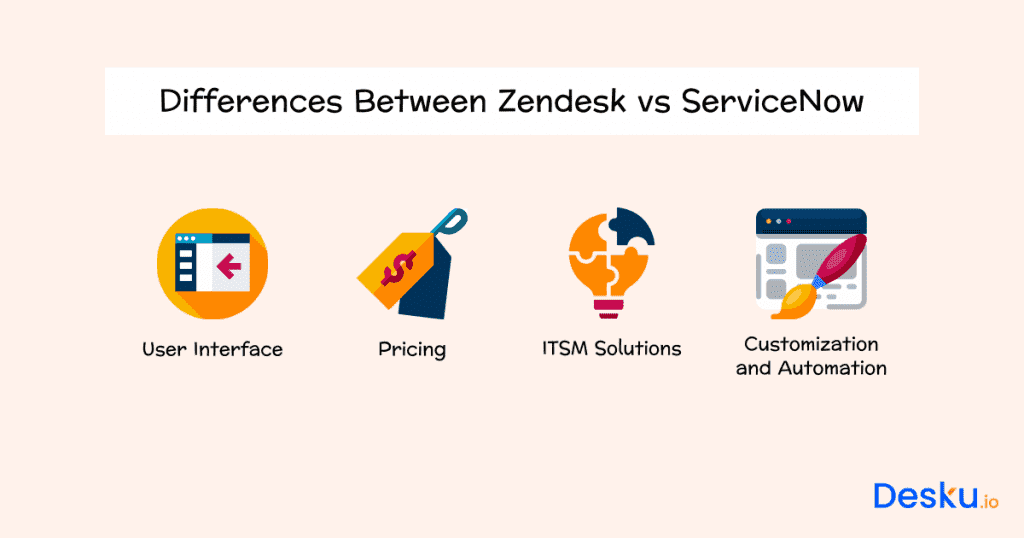
Whether Zendesk is better than ServiceNow depends on your requirements and the scale of the company. Zendesk offers a simple, affordable solution for customer support and service management. The ease of use and simple interfaces make it a good choice for small/medium businesses to boost support without complications.
Therefore, if you prefer Zendesk or ServiceNow, which are tailored to your needs within a certain degree of magnitude, Zendesk might be the best choice when it comes to simplicity, affordability, and ease of usage.
In the case of a service management platform with the more advanced capabilities and scalability required for an extensive company, ServiceNow would be a suitable option. If you believe in paying less and getting more features without compromising on features, you can go with Desku.
Is Zendesk cheaper than ServiceNow?
It is notable that in many cases, Zendesk remains far cheaper than ServiceNow. The companies concentrate mostly on customer support and service management. Furthermore, Zendesk offers different prices based on its client’s needs that are appropriate for even some small and medium enterprises, thus reaching more users.
However, ServiceNow is a complete ITSM solution that usually costs more. In order to choose one or the other in the case of your organization, you would want to look into what exactly your organization requires, the financial constraints, and the required capabilities needed to make your service management goals.
Does Zendesk Integrate with ServiceNow?
Yes! Zendesk integrates with third-party tools like Zapier and Workato in order to work well with ServiceNow. This will enable businesses to leverage the customer service and engagement functionality available on Zendesk with ITSM functionality that is incorporated in ServiceNow.
Can ServiceNow replace Zendesk?
Whether or not ServiceNow replaces Zendesk will depend on what kind of service management and as well as customer support your organization requires. The company provides an ITSM platform that also accommodates CSM and FSM. The service workflow automation and complex incidents are its key strengths.
Although that is what ServiceNow can cater to customer support, there are complexities and unnecessary costs for organizations, majorly on Zendesk as a customer support tool. Due to this fact, the decision relies upon your organization’s wider service management requirements and the magnitude of possible adaptation and expansion.
Conclusion
ITSM can be provided by Zendesk or ServiceNow alternatives. Even though there are both strong points and weak points in these two platforms, one should make a choice based on the particular demands of his/her firm. Zendesk can be your choice if you’ve little money but need some basic customer service and engagement tools.
However, ServiceNow might as well be superior, depending on whether you need an enterprise-wide ITSM solution that is very good in terms of automation and customization.
Whichever platform you decide to go for, you should consider third-party integration in order to construct a fully blown answer to all your company’s needs. If you’re seeking something better than both of these services, it’s your time to check Desku pricing!
